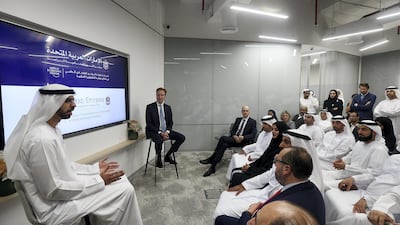The UAE is to be home to a World Economic Forum centre on new technology, which will design and draft policy on emerging technologies and study their impact on the region.
The Centre for the Fourth Industrial Revolution, which will be in Dubai's Emirates Towers, was inaugurated on Sunday by Minister of State for Artificial Intelligence Omar Al Olama and Norwegian politician Borge Brende, president of the World Economic Forum.
It will try to understand the impact of artificial intelligence on the country and region, working closely with governments, businesses, academics and international organisations.
The Dubai think-tank will work on projects and case studies that use blockchain-based technology, artificial intelligence and precision medicine, and will co-ordinate with teams in other similar centres in Japan, China, the US and India.
“In the UAE, we have never been scared of technology – instead we embrace the future,” Mr Al Olama said.
“But the challenge will be one of governance. We need to understand how governments can deal with development and the deployment of new technology, and what the requirements are in terms of policy and legislation.”
The Fourth Industrial Revolution is characterised by the shift toward automation, using robots, AI and the Internet of Things.
According to the 2018 Future of Jobs report, the shift in working methods could displace an estimated 75 million jobs by 2022 in the major world economies. But experts say that new technology could also create 133 million new roles for people who can train to work with machines and data.
Mr Brende said that the UAE had been selected to host the centre as it is a forward-looking nation in a fast-changing world.
“Today, there are not many rules when it comes to new technologies. We want to work with governments and civil society to put together these rules because new technologies have the potential for tremendous growth. But they could also have a negative impact,” he said.
“It is important to bring the private sector together with governments to work towards solutions.”
The UAE made its intention to carve out a niche in the technology sector clear with the appointment of a Minister of State for Artificial Intelligence in 2017. The country says that it aims to retrain and re-educate the youth in areas that will be of use in the future.
Mr Al Olama said the information gathered at the centre will be shared with the world.
“We hope there will be publications that come out of the centre that we can share with the rest of the world, a tangible impact that our partners can use as well,” he said.
“The interesting thing about the Fourth Industrial Revolution is that the emerging technologies are mostly cross border – artificial intelligence, for instance, is not just a local technology or strategy, but it will provide a greater good for the rest of the world. Everyone needs to come together on finding solutions.”

